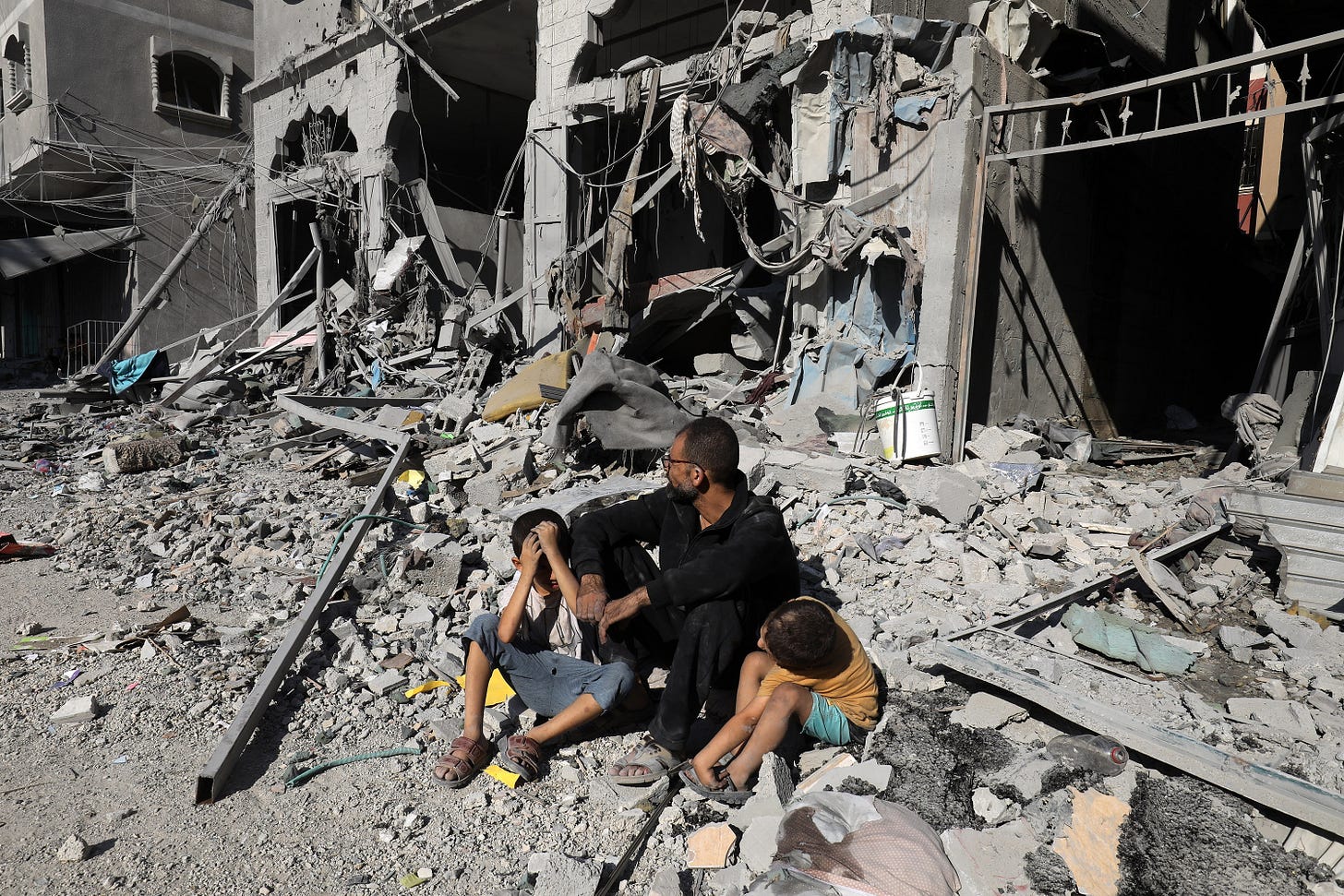Why Israel is losing at the World Court
Do you think the ruling will make a difference?
Yesterday the World Court handed down its anticipated initial ruling on South Africa’s case of genocide against Israel over its conduct in Gaza.
The court ordered that Israel must “take all measures within its power to prevent” any acts of killing or hardships in Gaza that would violate its obligations under the Genocide Convention, which was introduced in 1948 in response to the Holocaust. It said Israel must also “ensure with immediate effect” that its military does not commit such acts.
The hearings took place in The Hague, with South Africa seeking an order to stop Israeli attacks while the case unfolded. Israel's defence argued for dismissal, emphasizing South Africa's alleged delegitimization of Israel's existence.
Neither was completely successful, with the court moving forward with the genocide case (which may take several years), while stopping short of ordering an immediate ceasefire.
Last week one of our favourite podcasts, CBC’s FrontBurner, spoke to William Schabas, a Canadian academic and expert on genocide (BTW I connected with Schabas many years ago when I was President of the Rideau Institute in Ottawa).
The interview discussed the case filed by South Africa against Israel in the International Court of Justice (ICJ), accusing Israel of committing genocide in Gaza.
South Africa's arguments:
South Africa's case revolved around accusing Israel of genocide in Gaza. They presented evidence of Israel's acts, such as attacks on civilian areas, destruction of property, and imposing a siege on Gaza, leading to potential harm to the population. South Africa also highlighted statements from Israeli officials, suggesting genocidal intent.
Statement by Israel’s government officials (translation)
“There will be no electricity, no food, no water, no fuel. We are fighting human animals.” - Israel’s Defence Minister
“It's an entire nation out there that's responsible.” - Israel’s President
“They're all terrorists, and they should also be destroyed.” - Israel’s hard-line Minister for National security
“We all have one common goal, erasing the Gaza Strip from the face of the Earth.” - The Deputy speaker of Parliament
Israel's defence:
Israel argued against the case, contending that South Africa was undermining Israel's legitimacy. Israel's defence focused on acts by Hamas, claiming that the use of the Israel Defence Forces was driven by self-defence against a perceived threat. Israel distanced itself from controversial statements made by officials and emphasized its efforts to address security concerns and recover hostages.
William Schabas’ expectations:
William Schabas suggested that Israel's defence faces challenges, especially concerning the genocidal intent. Schabas emphasized that the court's ruling, even without direct enforcement powers, could impact the political environment and influence how nations responded to the case.
Leave a comment explaining your choice (become a paid subscriber at $5.50/month and claim your free copy of Naomi Klein's "Doppelganger: A Trip into the Mirror World" - a $38 value).
The Doomsday Clock has never been closer to midnight
The experts at the Bulletin of the Atomic Scientists are warning humanity that we are living in a moment of historic danger, so they left the hands of the famous Doomsday Clock at 90 seconds to midnight this year. In its 75+-year history, the clock has never been closer.
In a statement they said, “Today, we once again set the Doomsday Clock at 90 seconds to midnight because humanity continues to face an unprecedented level of danger. Our decision should not be taken as a sign that the international security situation has eased. Instead, leaders and citizens around the world should take this statement as a stark warning and respond urgently, as if today were the most dangerous moment in modern history. Because it may well be.”
What is the Doomsday Clock?
The Bulletin of the Atomic Scientists was created by scientists who saw an immediate need for a public reckoning in the aftermath of the atomic bombings of Hiroshima and Nagasaki in 1945.
The former magazine, and now website, features the iconic Doomsday Clock on its cover. Each year the magazine’s publishers and experts decide whether to move the hands away – or closer to midnight.
They set the Doomsday Clock at two minutes to midnight in 2019 and at 100 seconds to midnight in 2022. Last year, they expressed their heightened concern by moving the Clock to 90 seconds to midnight in large part because of Russian threats to use nuclear weapons in the war in Ukraine.
It’s not improving
Ominous trends today continue to point the world toward global catastrophe:
The war in Ukraine and the widespread and growing reliance on nuclear weapons increase the risk of nuclear escalation.
China, Russia, and the United States are all spending huge sums to expand or modernize their nuclear arsenals, adding to the ever-present danger of nuclear war through mistake or miscalculation.
In 2023, Earth experienced its hottest year on record, and massive floods, wildfires, and other climate-related disasters affected millions of people around the world.
Meanwhile, rapid and worrisome developments in the life sciences and other disruptive technologies accelerated, while governments made only feeble efforts to control them.
Support peace education
As a bonus until the end of January, subscribe at $5.50/month and claim your free copy of Naomi Klein's "Doppelganger: A Trip into the Mirror World" (hardcover, a $38 value).






Yes, all this action by South Africa has drawn attention to the patently genocidal intent -and genocidal activities- of Israeli leadership.- and, we must add, its too-silent and relenting population.
We can all feel endless shame for Canada's wan response ("wan" is too kind by half). Never has the history of our own genocidal intents toward Indigenous people here been more evident than when we see Canada's pitiful and skulking responses to Israel's treatment of what it calls "human animals". The maxim, the children of victims become terrorists, has a place in this unfolding...
Israel is a nuclear power and it has the seemingly undisputed support from USA, Germany and Britain. Anything Israel does seems to be legitimized by the fact that Jews suffered the Holocaust. ( which shows how genocidal violence traumatises through the generations). In Germany you can not critizise Israel even jews can not . It would lead to blacklisting. Don't get me wrong it is important that the case comes before the International court, but it is sad and beyond reason , that a cease fire was not ordered.